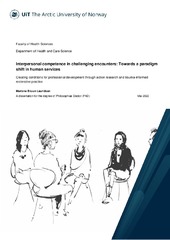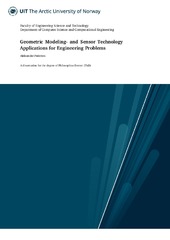| dc.contributor.advisor | Eriksen, Trond | |
| dc.contributor.author | Lauridsen, Marlene Bruun | |
| dc.date.accessioned | 2022-09-12T12:31:28Z | |
| dc.date.available | 2022-09-12T12:31:28Z | |
| dc.date.issued | 2022-10-04 | |
| dc.description.abstract | Helse- og sosialarbeidere, i private og offentlige arbeids- og velferdstjenester, har daglig kontakt med mennesker som har traumeerfaringer og sammensatte behov. Kommunikasjonen kan være følelsesmessig utfordrende og mange fagpersoner opplever dårlig tid, utrygghet og stress i arbeidet. Utrygghet og stress øker konfliktnivået og har en negativ effekt på fagpersoners velvære, holdninger til tjenestebrukere og dermed kvaliteten på tjenesten som tilbys. Dette forskningsprosjekt synliggjør at det i utdanning og praksis brukes for lite tid til å utvikle mellommenneskelig kompetanse, og slik forberede ansatte på refleksjon over følelsesmessig utfordrende møter med mennesker. Det å styrke grunnkompetansen og jobbe aktivt med å forstå måten vi selv og andre kommuniserer kan gjøre oss tryggere i møte med mennesker som vi ellers har en tendens til å beskrive som vanskelige. I løpet av dette aksjonsforskningsprosjektet fikk ni sykepleierstudenter og 20 sosialarbeidere delta på en seks dagers traume-informert restorativ sirkelprosess. Vi brukte tid på å bygge trygghet, konflikthåndterings- og meklingskompetanse samtidig med at vi utfordret egen kommunikasjon, praksis og systemene som praksisen foregår innenfor. Videre utforsket vi hindringer og hva som bidra til mellommenneskelig læring og praksis. Det som kommer frem i forskningsprosjektet er at når vi er emosjonelt trygge fungerer vi bedre på alle måter: Vi er mer rolige, mer lyttende, mer medfølende med både oss selv og andre og dermed bedre rustet til å møte stress og traumereaksjoner. Funnene antydet at mellommenneskelig kompetanse for de utfordrende møter kan utvikles gjennom et trygt kommunikativt rom, og dermed legge til rette for selvbevissthet, økt toleranse for stress, traumeinformert praksis og personlig utvikling. Videre bidrar denne studien til dialoger mellom teori og praksis knyttet til å fremme kunnskap om hvordan mellommenneskelig kompetanse og kollektiv omsorg kan styrkes i praksis og utdanning. Dette vil kunne redusere utbrenthet samt øke kvaliteten i tjenesten, for både praksisutøveren og brukere. | en_US |
| dc.description.abstract | Health and social workers, in private and public work and welfare services, have daily contact with people who have trauma experiences and complex needs. Communication can be emotionally challenging, and many professionals experience too high job demands, insecurity and stress in their work. Insecurity and stress increase conflict levels and have a negative effect on the well-being of professionals, attitudes towards clients and the quality of service offered. This research project highlights that too little time is spent developing interpersonal competence and preparing employees for and reflecting on emotionally challenging human encounters, in education and practice. Strengthening interpersonal competence and actively working to understand the way we ourselves and others communicate can make us safer in the face of people, which we otherwise tend to describe as difficult. During this critical action research project, nine nursing students and 20 social workers participated in a six-day trauma-informed restorative circle process. We spent time building a safe environment, understanding conflict transformation and mediation, while challenging our own communication, practice, and the systems within which the practice takes place. As well as exploring hindrances and contributors for interpersonal learning and practice. What emerges in the research project is that when we are emotionally safe, we work better in every way, we are calm, listen more, are enabled to understand and be more compassionate with ourselves and others and thereby better equipped to face stress and trauma reactions. The findings suggested that interpersonal competence for the challenging encounters can be developed through a safe communicative space, thereby facilitating self-awareness, increased tolerance to stress, trauma-informed practice, and personal development. Furthermore, this study contributes to a dialogue between theory and practice related to promoting knowledge about how interpersonal competence and collective care can be strengthened in practice and education. This may help to reduce burnout and increase the quality of the service, for both the practitioner and clients. | en_US |
| dc.description.doctoraltype | ph.d. | en_US |
| dc.description.popularabstract | Health and social workers, in private and public work and welfare services, are in daily contact with people who have trauma histories and complex needs. During this critical participatory action research project, the participants joined a six-days restorative circle process and were provided with the opportunity to explore hindrances and contributors for interpersonal learning and practice in their professional work and education. The findings suggested that interpersonal competence can be developed through a safe communicative space, such as a trauma-informed restorative circle process, thus facilitating self-awareness, increased tolerance of stress, a trauma informed practice and personal development, hence strengthening the personal and interpersonal competence in challenging encounters. Moreover, this study contributes to dialogues among research, practice, and professional communities concerned with fostering knowledge on how interpersonal competence and collective care may be strengthened in practice and education. | en_US |
| dc.description.sponsorship | UiT | en_US |
| dc.identifier.uri | https://hdl.handle.net/10037/26771 | |
| dc.language.iso | eng | en_US |
| dc.publisher | UiT The Arctic University of Norway | en_US |
| dc.publisher | UiT Norges arktiske universitet | en_US |
| dc.relation.haspart | <p>Paper 1: Lauridsen, M.B. (2020). Læring i sirkel. In Thoresen, A.-L. & Norbye, B. (Eds), Forskning og kunnskapsutvikling i helsefaglig profesjonsutdanning, pp 31–54. Stamsund: Orkana akademisk. Also available in Munin at <a href=https://hdl.handle.net/10037/23406>https://hdl.handle.net/10037/23406</a>.
<p>Paper 2: Lauridsen M.B. & Munkejord, M.C. (2022). Creating Conditions for Professional Development through a Trauma-Informed and Restorative Practice. <i>Social Work, 67</i>(2), 135–144. (Accepted manuscript version). Published version available at <a href=https://doi.org/10.1093/sw/swac005>https://doi.org/10.1093/sw/swac005</a>. Accepted manuscript version also available in Munin at <a href=https://hdl.handle.net/10037/24744> https://hdl.handle.net/10037/24744</a>.
<p>Paper 3: Lauridsen, M.B. (2021). Individuell og kollektiv sårbarhet i hjelperrollen. In Kane, A.A. & Spjelkavik, Ø. (Eds.), Arbeidsinkludering, læring og innovasjon i NAV, pp 353–376. Stamsund: Orkana akademisk. Also available in Munin at <a href=https://hdl.handle.net/10037/26738>https://hdl.handle.net/10037/26738</a>. | en_US |
| dc.rights.accessRights | openAccess | en_US |
| dc.rights.holder | Copyright 2022 The Author(s) | |
| dc.rights.uri | https://creativecommons.org/licenses/by-nc-sa/4.0 | en_US |
| dc.rights | Attribution-NonCommercial-ShareAlike 4.0 International (CC BY-NC-SA 4.0) | en_US |
| dc.subject | VDP::Medisinske Fag: 700::Helsefag: 800::Sykepleievitenskap: 808 | en_US |
| dc.subject | VDP::Medical disciplines: 700::Health sciences: 800::Nursing science: 808 | en_US |
| dc.subject | VDP::Samfunnsvitenskap: 200::Pedagogiske fag: 280::Allmennpedagogikk: 281 | en_US |
| dc.subject | VDP::Social science: 200::Education: 280::General education: 281 | en_US |
| dc.subject | VDP::Samfunnsvitenskap: 200::Sosialt arbeid: 360 | en_US |
| dc.subject | VDP::Social science: 200::Social work: 360 | en_US |
| dc.subject | VDP::Samfunnsvitenskap: 200::Psykologi: 260 | en_US |
| dc.subject | VDP::Social science: 200::Psychology: 260 | en_US |
| dc.title | Interpersonal competence in challenging encounters: Towards a paradigm shift in human services - Creating conditions for professional development through action research and trauma-informed restorative practice | en_US |
| dc.type | Doctoral thesis | en_US |
| dc.type | Doktorgradsavhandling | en_US |


 English
English norsk
norsk



